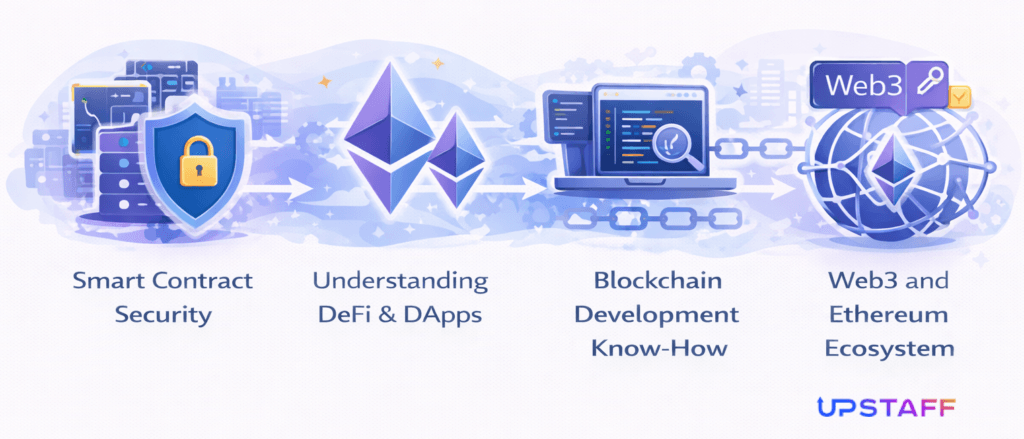Want to hire Ethereum developers? Then you should know!
What’s Ethereum Blockchain All About?
Ethereum’s the crypto kingpin—Vitalik Buterin kicked it off in ’15, turning blockchain into a programmable beast. By 2025, it’s still the gold standard—think Solidity contracts, ERC-20 tokens, or EVM churning decentralized apps on ETH 2.0’s proof-of-stake. It’s not just Bitcoin’s shadow; it’s a platform for smart deals, NFTs, and DeFi that rewrites the rules.
What Can Ethereum Blockchain Developers Do For You?
Our Ethereum developers can whip up whatever you’re plotting. Want a dApp? They’ll hammer Solidity—say, a lending platform that locks funds tight. Token gig? They’ll mint ERC-20s—think a loyalty coin that trades fast. Big idea? They’ll rig a DAO—maybe a voting system that runs itself. From quick drops to deep DeFi, they’ve got custom Ethereum solutions that hit.
Who’s on Our Ethereum Team?
Our ETH crew’s a battle-scarred pack—some kicked off with CS degrees, others clawed up through crypto hacks. They’re wired for Ethereum—Solidity, Truffle, maybe some Rust too—and eat JavaScript or Python for lunch. They’ve shipped contracts, bridged chains, even patched live exploits—real scars that prove they can crush your gig.
How Do You Know They’re Good For Hire?
How do you spot an Ethereum developer worth hiring? Grill them—what’ve they deployed? Contracts? DeFi pools? Check if they’ve dodged a reentrancy bug or cut gas costs. Ours can spin yarns—like rigging an NFT drop on mainnet or chasing a tx fail through Etherscan. If they’ve battled Hardhat errors or debugged a live chain, they’ve got the Ethereum blockchain development fire you need.
Ethereum Blockchain in 2025 and What’s Next
By March 20, 2025, Ethereum’s still ruling—ETH 2.0’s humming, sharding’s live, and gas is leaner. Our developers see it owning DeFi—think yield farms or DEXs—and growing with NFT markets or cross-chain plays. It’s not slowing—might lean into zero-knowledge proofs or tighter L2 hooks soon. Hire Ethereum (ETH) developers now, and they’ll keep your blockchain edge lethal for what’s next.

TOP Ethereum blockchain Related Technologies
TOP Ethereum Blockchain Related Technologies
Essential tools, languages, and infrastructure for building smart contracts and DApps on Ethereum.
Ethereum
Ethereum is a decentralized, open-source blockchain platform that enables developers to build and deploy smart contracts and decentralized applications (DApps). It is the foundation for most Ethereum software development.
Solidity
Solidity is the most popular programming language for writing smart contracts on the Ethereum platform. It is statically typed, supports inheritance, and has a syntax similar to JavaScript, making it easy for developers to learn and use.

Truffle
Truffle is a development framework that simplifies the process of building, testing, and deploying smart contracts on the Ethereum network. It provides a suite of tools and libraries for smart contract development, testing, and deployment.

Ganache
Ganache is a personal Ethereum blockchain for development and testing purposes. It allows developers to simulate the behavior of the Ethereum network locally, making it easier to test and debug smart contracts.
How and where is Ethereum blockchain (ETH) used?
| Case Name | Case Description |
|---|---|
| Decentralized Finance (DeFi) | Ethereum blockchain has become the backbone of the booming decentralized finance industry. DeFi applications built on Ethereum offer financial services such as lending, borrowing, decentralized exchanges, and stablecoins. These applications eliminate the need for intermediaries, reduce costs, and provide greater accessibility to financial services for individuals globally. |
| Non-Fungible Tokens (NFTs) | Ethereum’s ERC-721 standard allows for the creation and trading of unique digital assets known as non-fungible tokens (NFTs). NFTs have gained immense popularity in various sectors, including art, gaming, collectibles, and virtual real estate. Ethereum’s smart contract functionality enables secure ownership, provenance, and transferability of NFTs, revolutionizing the way digital assets are created and exchanged. |
| Supply Chain Management | Ethereum blockchain provides a transparent and immutable ledger, making it ideal for supply chain management. By recording every transaction and movement of goods on the blockchain, stakeholders can easily track and verify the origin, authenticity, and journey of products. This helps combat counterfeiting, ensures fair trade practices, and increases consumer trust in the supply chain ecosystem. |
| Decentralized Applications (DApps) | Ethereum’s smart contract capabilities enable the development of decentralized applications (DApps) that operate without central authorities. These applications can range from decentralized social networks and prediction markets to decentralized file storage and identity verification systems. Ethereum’s robust infrastructure and large developer community make it a popular choice for building innovative DApps. |
| Governance and Voting | Ethereum blockchain can be utilized for secure and transparent governance and voting systems. By deploying smart contracts, organizations can ensure fair and tamper-proof decision-making processes. Blockchain-based voting systems eliminate the risk of fraud and manipulation, allowing for more inclusive and democratic governance structures. |
| Energy and Sustainability | Ethereum blockchain can be leveraged to promote energy efficiency and sustainability initiatives. Through smart contracts and tokenization, renewable energy producers can track the generation and distribution of clean energy. Blockchain-enabled peer-to-peer energy trading platforms can incentivize individuals to adopt renewable energy sources and contribute to a greener future. |
| Identity Management | Ethereum blockchain offers a decentralized and secure approach to identity management. By storing identity information on the blockchain, individuals can have control over their personal data and share it selectively with service providers. This can reduce identity theft, streamline identity verification processes, and enhance privacy in the digital world. |

Vitalik Buterin. “775040520SB00199_TechCrunch” by TechCrunch is licensed under CC BY 2.0
TOP 11 Facts about Ethereum blockchain (ETH)
- Ethereum is a decentralized blockchain platform that enables the creation and execution of smart contracts.
- It was proposed by Vitalik Buterin in late 2013 and the development of Ethereum began in early 2014.
- Ethereum’s native cryptocurrency is called Ether (ETH), and it is used to facilitate transactions and incentivize participants on the network.
- Ethereum introduced the concept of smart contracts, which are self-executing contracts with the terms of the agreement directly written into code. They automatically execute when the predefined conditions are met.
- Smart contracts on the Ethereum blockchain have numerous applications, ranging from decentralized finance (DeFi) and decentralized applications (DApps) to supply chain management and voting systems.
- One of the key features of Ethereum is its ability to support the development and deployment of decentralized applications. This has led to a vibrant ecosystem of developers building innovative solutions on the platform.
- Ethereum uses a consensus algorithm called Proof of Stake (PoS), which is more energy-efficient compared to the Proof of Work (PoW) algorithm used by Bitcoin.
- The Ethereum blockchain has undergone several major upgrades, including the recent upgrade to Ethereum 2.0, which aims to improve scalability, security, and sustainability of the network.
- Ethereum has a significant market capitalization and is one of the most widely recognized cryptocurrencies in the world.
- Many other blockchain projects and tokens are built on top of the Ethereum platform, leveraging its infrastructure and network effects.
- Ethereum has a strong and active community of developers, enthusiasts, and contributors who continuously work on improving the ecosystem and building new applications.
Pros & cons of Ethereum blockchain (ETH)
7 Pros of Ethereum blockchain (ETH)
- Ethereum is the second-largest blockchain platform by market capitalization, making it a highly recognized and established network in the cryptocurrency industry.
- Ethereum is known for its smart contract functionality, which allows developers to build decentralized applications (DApps) on top of the blockchain. This opens up a wide range of possibilities for creating innovative and autonomous applications.
- Ethereum has a large and active community of developers and supporters, which fosters continuous development and improvement of the platform.
- Ethereum offers faster transaction times compared to Bitcoin, with an average block time of around 15 seconds. This makes it more suitable for applications that require quick transaction confirmations.
- Ethereum has a scalable infrastructure that is designed to handle a high volume of transactions. This scalability is achieved through the implementation of technologies like sharding and layer 2 solutions, which help improve network efficiency.
- Ethereum has a robust and secure network, with multiple layers of consensus algorithms that ensure the integrity and immutability of the blockchain.
- Ethereum has a diverse ecosystem of decentralized finance (DeFi) applications, which provide various financial services such as lending, borrowing, and trading without the need for intermediaries. This has led to the rapid growth of the DeFi industry and has positioned Ethereum as a key player in this space.
7 Cons of Ethereum blockchain (ETH)
- Ethereum currently faces scalability challenges, with high network congestion during periods of high demand. This can lead to increased transaction fees and slower transaction times.
- The energy consumption of the Ethereum network is relatively high, as it relies on a proof-of-work (PoW) consensus algorithm. This has raised concerns about its environmental impact.
- Ethereum has experienced network security vulnerabilities in the past, resulting in thefts and hacks. However, the Ethereum community has been proactive in addressing these issues and implementing security improvements.
- The upgrade process of the Ethereum network, such as the transition to Ethereum 2.0, can be complex and require coordination among stakeholders. This introduces potential risks and uncertainties during the transition period.
- Ethereum’s smart contract functionality can be susceptible to coding errors or vulnerabilities, which can lead to financial losses or exploitation of the network.
- Ethereum’s governance structure is still evolving, and decisions regarding network upgrades and protocol changes can sometimes be contentious and lead to community debates.
- While Ethereum has a large user base, adoption outside of the cryptocurrency space is still relatively limited. This can impact the mainstream acceptance and utilization of the platform.
Hire Ethereum Game Developer
Looking to hire an Ethereum game developer who can sling blockchain chaos into something playable? By March 23, 2025, Ethereum’s still the kingpin for gaming on-chain—think smart contracts that run loot drops or NFTs you can actually trade. These devs are a rare breed, mixing Solidity chops with game dev grit—Ethereum game developer jobs ain’t for the faint; you’re wrangling EVM, gas fees, and Unity or Phaser to make it fun. Hunt where the nerds lurk—GitHub for Ethereum game developer portfolios, or tap top Ethereum game development companies like ConsenSys if your wallet’s fat—they’re building the next wave of blockchain game development on Ethereum, messy but loaded with potential.
What Ethereum Game Developers Bring
What’s the tech? Ethereum gaming smart contracts are the guts—code that locks in rules, payouts, or NFT mints, no middleman screwing it up. Ethereum game programming languages lean on Solidity—JavaScript’s gruff cousin—plus JavaScript or TypeScript for front-end glue. Best Ethereum game development tools? Hardhat’s clutch for testing, Truffle’s old reliable, and Remix if you’re just getting started with Ethereum game development. Ethereum game developer salary? $90k-$150k stateside in 2025—more if they’ve shipped a hit—‘cause is Ethereum game development profitable? Damn right, if your game hooks the crypto crowd with Ethereum game NFT integration like rare swords or skins that sell.
How They Work and Why It Matters
These devs live in the Ethereum game development community—Discord, Reddit, spots where gas woes get hashed out. How to hire an Ethereum game developer? Snag ‘em with Ethereum game development services—some rig a dice roller demo, others build whole worlds like Decentraland. How to become an Ethereum game developer? Grind a Ethereum game developer course—Udemy’s got cheap ones—then hack something to show off. Ethereum game development best practices? Keep gas low, audits tight, UX smooth—players don’t give a crap about your chain, they want fun; in 2025, it’s early days, and the payoff’s still a gamble worth taking.
Talk to Our Expert
Our journey starts with a 30-min discovery call to explore your project challenges, technical needs and team diversity.






